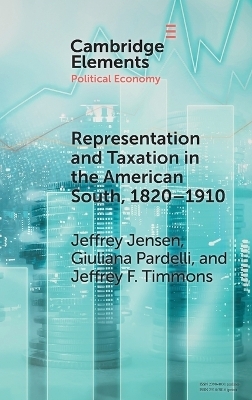
Representation and Taxation in the American South, 1820–1910
Seiten
2024
Cambridge University Press (Verlag)
978-1-009-45405-6 (ISBN)
Cambridge University Press (Verlag)
978-1-009-45405-6 (ISBN)
This Element explains and documents state-level fiscal developments in American Southern states from 1820–1910. Using an original, archival data set of annual tax revenues, we show that the economic interests of rural elites played a critical role in shaping the observed fiscal patterns within and across these states over this period.
We explain and document state-level fiscal developments in American Southern states from 1820–1910, focusing on their main source of revenue, progressive property taxes borne primarily by economic elites. The fourteen states in our analysis were characterized by severe economic exploitation of the enslaved and later politically repressed African-descended population by a small rural elite, who dominated the region both politically and economically. While rural elites are thought to be especially resistant to taxation, we offer a set of conditions that explains the emergence of progressive taxation and provides a coherent account of the fiscal development of these states over this period. Using an original, archival data set of annual tax revenues and select expenditure items, we show that the economic interests of these rural elites and the extent of their formal (over)representation played a critical role in shaping the observed fiscal patterns within and across these states over this period. This title is also available as Open Access on Cambridge Core.
We explain and document state-level fiscal developments in American Southern states from 1820–1910, focusing on their main source of revenue, progressive property taxes borne primarily by economic elites. The fourteen states in our analysis were characterized by severe economic exploitation of the enslaved and later politically repressed African-descended population by a small rural elite, who dominated the region both politically and economically. While rural elites are thought to be especially resistant to taxation, we offer a set of conditions that explains the emergence of progressive taxation and provides a coherent account of the fiscal development of these states over this period. Using an original, archival data set of annual tax revenues and select expenditure items, we show that the economic interests of these rural elites and the extent of their formal (over)representation played a critical role in shaping the observed fiscal patterns within and across these states over this period. This title is also available as Open Access on Cambridge Core.
1. Introduction; 2. The Existing Literature; 3. Data and Empirical Strategy; 4. Property Taxes Before the Civil War; 5. Post-War Taxation; 6. Conclusion; References.
| Erscheinungsdatum | 13.02.2024 |
|---|---|
| Reihe/Serie | Elements in Political Economy |
| Zusatzinfo | Worked examples or Exercises |
| Verlagsort | Cambridge |
| Sprache | englisch |
| Gewicht | 287 g |
| Themenwelt | Wirtschaft ► Volkswirtschaftslehre ► Wirtschaftspolitik |
| ISBN-10 | 1-009-45405-6 / 1009454056 |
| ISBN-13 | 978-1-009-45405-6 / 9781009454056 |
| Zustand | Neuware |
| Haben Sie eine Frage zum Produkt? |
Mehr entdecken
aus dem Bereich
aus dem Bereich
ausgehandelt? – wie offen ist die Weltgesellschaft?
Buch | Softcover (2024)
UTB (Verlag)
22,00 €
Theorie und Anwendung
Buch | Hardcover (2024)
Vahlen, Franz (Verlag)
39,80 €
wie sich unsere Wirtschaftspolitik ändern muss, damit wir globale …
Buch | Hardcover (2024)
Wiley-VCH (Verlag)
39,99 €


